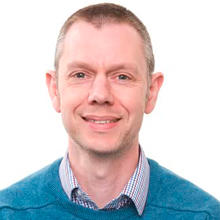An interview with Dr Mark Webber
January 2019
Dr Mark Webber is a Research Leader at the Quadram Institute. Here he talks about his current area of research, the role of scientists and microbiologists tackling Antimicrobial Resistance (AMR) as well as how he became a microbiologist by accident after being a part of the Society’s flagship Annual Conference Organising Committee.

Tell us about your area of research?
We are interested in how bugs become resistant to drugs and we study the genetic basis for the evolution of resistance and the consequences this has for the bugs. We are also particularly interested in how bacteria in different conditions respond to stress differently with biofilms (bacterial communities aggregated together) being a major focus.
How could your research help to tackle antimicrobial resistance?
We aim to understand how, when and where bugs can become resistant to drugs but also to identify under which conditions they can’t.
This can help us use current drugs to achieve best effects and inform developments of new ones.
What have you done to try to maximise the impact of your research?
We try and spread the word about our work to anyone who will listen, but also strive to work more closely with industry than we have in the past. This has helped us use our basic science to help with real world problems.
How important is AMR as a health issue?
Right now it’s a bad problem and significant numbers of patients are experiencing bad outcomes as we struggle to treat infections which we would have previously been able to cure. There are over 30,000 deaths per annum in Europe are a result of AMR and in other parts of the world the problem is much worse. The scary thing is the trajectory of this problem which has been accelerating in recent years and is only likely to get worse in the next decade.
What role do scientists and microbiologists have in tackling AMR?
To deal with AMR we will need better rapid diagnostics and new drugs – both of which need the basic science and microbiology to be carried out to develop methods and lead compounds, which can then be transformed into useful products. Without microbiologists this won’t happen.
In your opinion which areas of research are likely to have greatest impact on tackling AMR in the future?
Rapid, cheap diagnostics to identify causative pathogens in a useful timeframe. This will allow narrow spectrum drugs to be useful for acute infection and development. We should also be aiming to focus on way to stop bugs causing infection in the first place, for instance, blocking biofilm formation could be useful.
Why did you choose to become a microbiologist?
It was an accident – I went to university to study biology at Birmingham not liking microbiology at all and by luck found myself in a department with one of the strongest groups of microbiologists in the UK. I graduated with a degree in microbiology having been indoctrinated!
Tell us about your biggest professional achievement(s) so far?
Some of our work about how biocides can impact antibiotic resistance informed changes to EU wide laws, requiring new biocides to show they don’t select for AMR to be licensed. On a less dull note, lots of people have come through the lab, enjoyed their experience and decided to pursue a career in microbiology which is the best legacy you can have in my opinion.
Do you have any advice for early career scientists who’d like to work in AMR?
Find a lab opportunity which allows you to work on something you think is interesting and exciting and talk to them. Most people will be happy to engage and can help point you towards any opportunities to get involved.
Why does microbiology matter?
Bugs influence our lives in multiple ways both positive and negative, so microbiology is a key discipline for life in the modern world.
Why do you think the Microbiology Society is important?
It’s a fantastic society for providing routes to meet likeminded people, sharing news and creating new collaborations. It is brilliant at helping young scientists become part of the community.
Tell us about the Microbiology Society activities you have taken part in and why you think other members should also think about getting involved with our work.
I’ve been lucky enough to be involved in various society activities, but one of the most valuable experiences was being part of the annual meeting organising committee for a three-year term. This was great fun and there is a lot of satisfaction in going from brainstorming session ideas, to organising them, securing speakers and having the audience enjoy a good session. There is a mixture of joy and relief when it works out! I would encourage people to look at the various committee roles which are fun and rewarding.


